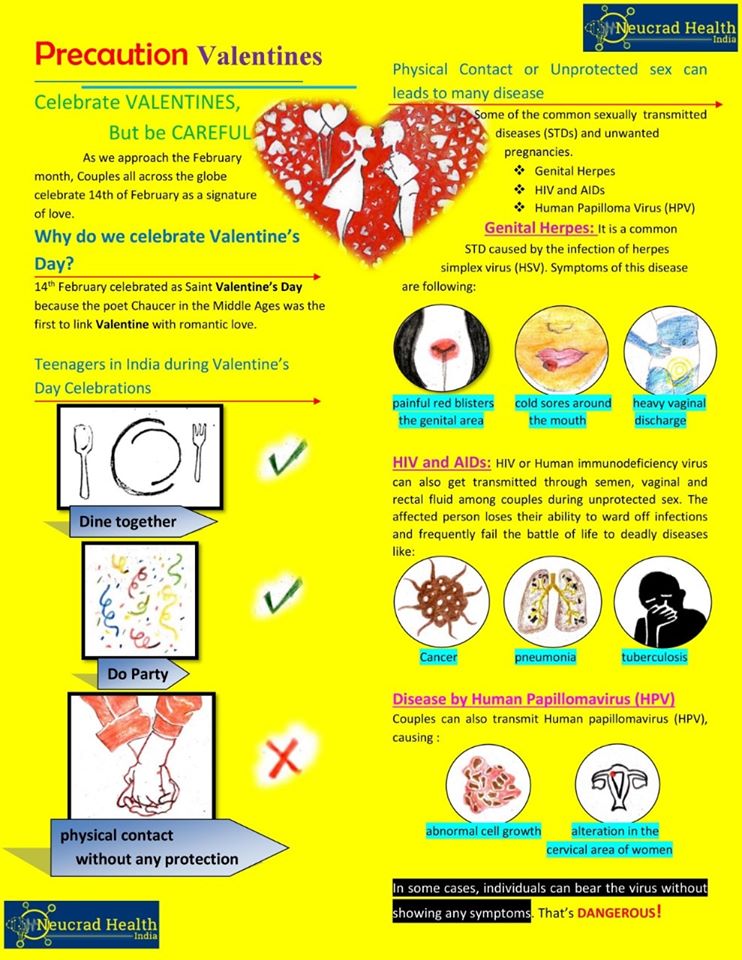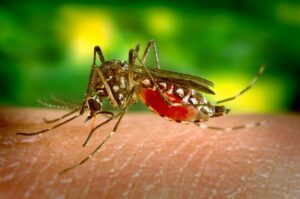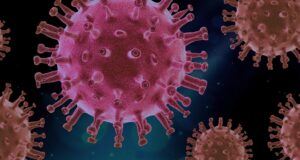Valentine’s Day and Its Global Influence among Teenagers

Neucrad Health news Desk February 14, 2022
As we approach the February month, we find most gifts shops and florists decked up with grandeur in the preparation of Valentine’s Day. Couples all across the globe celebrate 14th of February as a signature of love. They gift imported chocolates, French perfumes, and red rose bouquet as a commemoration of their undying love to their partners. However, in some cases, couples can get carried away during the celebration and indulge in unprotected sexual contacts. This, in turn, can lead to medical complications and unwanted pregnancies. Continue reading to know more about Valentine’s Day celebration in India and its consequences.
Why do we celebrate Valentine’s Day?
Before going into the impact of Valentine’s Day, let us have a brief idea about the origin of this celebration. Saint Valentine was an ancient Bishop in the Roman Empire born in 226 AD. During his time, Emperor Claudius II- a pagan used to rule Rome, and he did not like the concept of his countrymen converting to Christianity. He also passed a law that Roman soldiers should remain entirely devoted to their nation and refrain from getting married. However, Saint Valentine used to secretly married the soldiers to Christian ladies.
Emperor Claudius II later found out this and imprisoned the Saint. Even in jail, Saint Valentine cared about his fellow prisoners and the blind daughter of their judge. He cured her before being executed on the 14th of February 269 AD. Later on, people dedicated the 14th of February as Saint Valentine’s Day. It symbolises eternal love between couples.
How do teenagers get carried away during Valentine’s Day Celebrations?
Teenagers love to celebrate Valentine’s Day with great pomp and show with their partner. Couples go for a date, dine together, and spend romantic moments in privacy. However, in some cases, lust may get better of them, and young lovebirds indulge in sexual contact without any protection. It may lead to sexually transmitted diseases (STDs) and unwanted pregnancies. Many men and women face complications in their reproductive system due to irresponsible behaviour during teenage.
STDs Transmitted Frequently among Teenagers
Detailed below are some of the common STDs found among teenagers:
Genital Herpes
It is a common STD caused by the infection of herpes simplex virus (HSV). Two strains of the virus cause the disease- HSV-1 (herpes type 1) and HSV-2 (herpes type 2). The pathogen produces painful red blisters on the genital area, rectum, thighs, and buttocks. Patients also experience heavy vaginal discharge, pain during urination, and cold sores around the mouth. It mostly occurs through direct contact with infected patients during unprotected vaginal, oral, or anal sex. The virus can even stay dormant after transmission and do not show any symptoms. Acyclovir (Zovirax), famciclovir (Famvir), and valacyclovir (Valtrex) are some common medications prescribed for HSV infection.
HIV and AIDs
HIV or Human immunodeficiency virus can also get transmitted through semen, vaginal and rectal fluid among couples during unprotected sex. Additionally, a person can also contract the virus due to blood contact and through breast milk from the mother to the baby. The pathogen attacks the immune system of individuals by killing CD4 cells. When the virus load in the patient’s body surplus the immune cells, the individual gets affected by AIDS (Acquired Immunodeficiency Syndrome). The affected person loses their ability to ward off infections and frequently fail the battle of life to deadly diseases like cancer, pneumonia, and tuberculosis. However, if HIV gets detected early, modern treatment can keep the viral load under control and prevent the development of AIDS.

Human Papillomavirus (HPV)
Couples can also transmit Human papillomavirus (HPV), causing genital warts and abnormal cell growth and alteration in the cervical area of women. There are more than 100 strains of HCP; however, approximately 40 types of pathogen affect the genital areas. In some cases, individuals can bear the virus without showing any symptoms. They can transmit the disease without being aware of it. Though there is no cure for HPV, timely Gardasil, Cervarix, or Gardasil 9 vaccination at 11 to 12 years can prevent the disease.
These were some common consequences of unprotected physical contact during Valentine’s Day celebration. Finally, we would like to say that there is no harm in celebrating the day of love if you act responsibly and take adequate protective measures to prevent the transmission of STDs and unwanted pregnancies.











